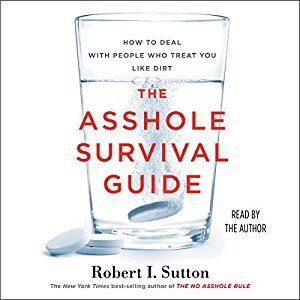
Cheery Friday Greetings to our Learning How to Learners!
Books of the Week
Maybe it’s just the excitement of fall that has our literary enthusiasm going, but this week we bounced back and forth between two dramatically different books just for the fun of it.
- The Soul of an Octopus: A Surprising Exploration into the Wonder of Consciousness, by Sy Montgomery. (Sy also read the Audible version of her book.) This National Book Award Finalist caught our attention because we had no idea that octopuses are so smart and so filled with personality. Montgomery is an infectiously enthusiastic writer who could get you excited about anything. The book also gives great insight into the behind-the-scenes work needed to run a world-class aquarium, and the magic of diving on coral reefs in search of wild octopuses. Have you always wondered how an utterly alien intelligence might think? Read on!
- Small Teaching: Everyday Lessons from the Science of Learning, by James Lang. We wanted to brush up on our face-to-face teaching skills, what with it being back-to-school time and all. Lang’s book was just the easy-to-read and perceptive ticket. Insights on issues such as how to incorporate retrieval practice, the value of having students make predictions, and why partial are better than perfect PowerPoints. Although James is a professor of English literature, his advice is often ideal for teaching STEM subjects. Highly recommended!
Read Like a CEO
If you’re looking to read more, but feel pressed for time—you have got to try MentorBox. Each week Mentorbox sits down “60 Minutes” like with bestselling authors and industry disruptors to explore their expertise. You can be confident they have great taste because they selected A Mind for Numbers as their paperback pick! Barb confides that this was the most extensive, insight-filled interview she has ever done. Watch Barb’s lesson shot from her very own living room here!
Don’t have time to read two books a month? Count on Mentorbox’s cheat sheets, audio summaries, workbooks, and videos to teach you what you need to know efficiently. The educational platform doubles as a monthly subscription service—curating a box that is designed for busy, ambitious professionals.
If you like to be on the cutting edge with new technological trends, sign up for Mentorbox. They are creating a fantastic new online niche for top authors so you can easily be in touch with the buzz.
Barb’s Smithsonian Event Has Sold Out—But a Bigger Venue Has Opened! Get Tickets Now!
Barb’s talk at the Smithsonian has been moved to the Baird Auditorium at the National Museum of Natural History to accommodate the crowds. If you’re anywhere in the DC area, Barb would love to see you—she’ll plan to be at the Auditorium early to mingle, chat, and say hello. The talk will be on Wednesday, Oct. 18 at 6:45 p.m. Register here. Bring friends and family for a fantastic overview of the key ideas of Learning How to Learn. And while you’re at it, learn fun-behind-the-scenes insights on how the course was created, and why it’s become the two-million-strong leviathan it is today!
Nelson Dellis’s BEST Video on Memory!
We’ve talked before about 4-time US Memory Champion Nelson Dellis and his great memory tips. Here’s his BEST video so far: “5 Memory Tips when You’re Just Getting Started.” If you’re looking to improve your memory, don’t miss this one! (If you would like to join Nelson in helping to support research on memory, please take the Extreme Memory Challenge.)
5 Online Business Courses That Will Make You Much Smarter (for Free)
Here’s a link from Inc. on the 5 top online business courses. Guess which two courses are #1 and #2?
The Fragile Generation
Here is a perceptive article by Jonathan Haidt on the crisis of resilience on campus. Haidt, incidentally, is the author of the fantastic best-selling book The Righteous Mind: Why Good People Are Divided by Politics and Religion. (Audible version here.) We’ve read it, and agree with the New York Times’ conclusion that Haidt’s book is “A landmark contribution to humanity’s understanding of itself.”
Science of Sport
We recently learned about a non-profit, Science of Sport, that uses sports to teach K-12 students math and science. They partner with professional baseball, soccer, basketball, and football teams to demonstrate real-life examples of math and science. Check out their video and Twitter feed. Since Science of Sport targets kids who struggle with math and science, they are using concepts from A Mind for Numbers in their curriculum, including focused and diffuse thinking as well as chunking. What better way to learn math and science than from sports! See also this article (page 40) about engineering professor Ricardo Valerdi, who conceptualized this highly effective approach.
Incidentally, here’s a MOOC on exercise by Robert Mazzeo from the University of Colorado – Coursera that started on September 4th.
Creativity
Curiosity and creativity are intimately related. If you’re curious about creativity, check out this worthwhile blog post on the creative process, “Master Creativity” by Ellen Twomey. Ellen’s thoughts echo excellent ideas we’ve heard from Terry about how to be creative.
Navigating the Shoals of Policy and Politics in Education
“Lost in translation: the policy and politics of Australian classroom practice,” by David Threlfall of the University of Melbourne (written for npj Science of Learning), describes some of the difficulties in making truly effective educational reform.
Teaching Basic Study Skills
Professor Kim-Leiloni Nguyen at Mt. San Antonio College in Walnut, California, took Learning How to Learn two years ago. With this and other information, she created a series of five-minute animated videos to teach students basic study skills. Check them out here.
That’s all for this week. Have a happy week in Learning How to Learn!
Barb, Terry, and the entire Learning How to Learn team
Follow LHTL on Facebook | Join the private LHTL Hall of Fame group | Follow LHTL on Twitter
See all book recommendations at cheeryfriday.com


















